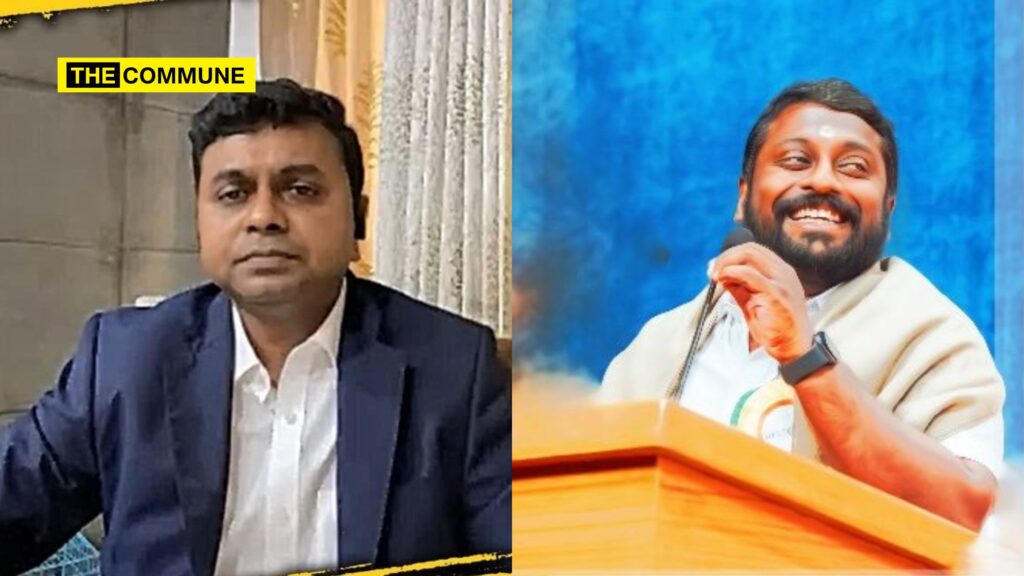In a recent development, the official spokesperson of DMK and joint secretary of the media wing of the part, Saravanan Annadurai, shared on his X handle that Finance Minister Nirmala Sitharaman’s statement claiming a 192% increase in state finance sharing is solely attributed to inflation. He also reiterated the narrative that the BJP is allegedly exploiting Tamil Nadu’s tax revenue, echoing the common sentiment that the central government is encroaching on state rights.
Union Finance Minister Nirmala Sitharaman’s statement news card shared by News18Tamilnadu stated, “Tax Distribution to Tamilnadu: ₹94,977 crore from 2004 to 2014 and ₹2,77,444 crore from 2014 to 2024.
Financial assistance to Tamil Nadu: This is 192% more. 57,924.42 crore from 2004 to 2014 to 2,30,893 crore from 2014 to 2023, an increase of 300% in nine years”.
In response to that, Saravanan wrote, “This is because of inflation! There was no GST from 2004 to 2014; the state governments were directly collecting the tax revenue. Now the Union government is giving it. The sun rises in the east from 2014-2024. BJP’s record is as absurd as it gets. #BJPLootingOurTax”
இதற்கு காரணம் பணவீக்கம்!
2004-2014 ஜிஎஸ்டி கிடையாது, மாநில அரசுகளே நேரடியாக அந்த வரி வருவாயை பெற்று வந்தது.இப்பொழுது ஒன்றிய அரசு கொடுக்கிறது.2014-2024 முதல் சூரியன் கிழக்கில் உதித்துக் கொண்டிருக்கிறது பாஜக சாதனை என்பது எவ்வளவு அபத்தமோ, அவ்வளவு அபத்தம் இது. #BJPLootingOurTax pic.twitter.com/msABWBjSep
— Saravanan Annadurai (@saravofcl) February 9, 2024
In response, SG Suryah, the State Secretary of Tamil Nadu Bharatiya Janata Party, accused Saravanan of spreading lies, emphasizing the direct flow of Excise Duty and Service Tax to the Central Government even before the GST regime.
Surya wrote, “1 Tweet, 100 Lies Mr. @saravofcl? What’s this? SGST directly goes to State Govts in the GST regime. Before 2014, Excise Duty & Service Tax from Tamil Nadu directly went to the TN Treasury? Is it a joke? It directly went to the Central Govt. even before the GST regime.”
1 Tweet 100 Lies Mr.@saravofcl ? What’s this?
• SGST directly goes to State Govts in the GST regime.
• Before 2014 Excise Duty & Service Tax from Tamil Nadu directly went to TN Treasury? Is it a joke? It directly went to Central Govt. even before GST regime. https://t.co/eliYMTnWBA
— Dr.SG Suryah (@SuryahSG) February 9, 2024
Netizens who read the post and discerned the bias in Saravanan’s statement criticized and ridiculed him for his lack of knowledge.
A netizen remarked, “50% of GST goes to state directly. Even some share of central GST component is shared with state. Do you comprehend vandu murugan?”
50% of GST goes to state directly. Even some share of central GST component is shared with state. Puriyatha vandu murugan?
— arumugam (@arutweetz) February 9, 2024
Another netizen unveiled his exposed his contradictory statement and remarked “Does a 10 percent rise in inflation mean a 194 percent rise? So admit that today’s NDA government has given more money than the previous UPA government”
பணவீக்கம் என்றால் ஒரு 10 சதவீதம் உயரும் இப்படி 194 சதவீதம் உயருமா? ஆக சென்ற UPA அரசு கொடுத்த பணத்தை விட இன்றைய NDA அரசு அதிகம் கொடுத்துள்ளது என்பதை ஒப்புக்கிறிங்க
— Karthik Viswanathan (@gkv76) February 9, 2024
Another netizen shed light on the unethical conduct of state government commercial tax officials during the 1980s. They engaged in deceptive practices, cheating both the government and the public by collecting taxes and misappropriating funds. The netizen described a situation where officials would accept a bribe of ₹1000 and instruct individuals to pay only a fraction, such as ₹1000, out of a larger tax amount, like ₹10,000.
மாநிலஅரசு வணிகவரி அதிகாரிகள்எப்படி வரிவசூல் செய்து அரசையும் மக்களையும் ஏமாற்றி கொள்ளையடித்தார்கள் என்று நன்றாகவே தெரியும் 1980கால கட்டங்களில் 10,000வரிகட்டவேண்டிய வரிடம்1000லஞ்சம் வாங்கிக்கொண்டு1000மட்டுமே வரி கட்டச் சொல்வார்கள் நீ அப்போது சிறுவனாகக் கூட இருந்திருக்கமாட்டாய்.
— Sundarraj modi family (@sundarraj62) February 9, 2024
Another netizen ridiculed him by saying, “What is the relationship between monetary inflation and fiscal allocation? Oh my gosh .. just thinking that he will go and make this stupid argument on any TV today .. oh my god. Then you say inflation is good, Melting”
பண வீக்கத்துக்கும் நிதி பகிர்விற்கும் என்ன சம்பந்தம்
ஐயோ ..இந்த கூமுட்ட வாதத்தை இன்னைக்கு எந்த டிவிலேயாவது போய் உளறுவான் அதை நினைக்கும் போது தான் ..கடவுளே
அப்போ பண வீக்கம் நல்லதுன்னு சொல்றியா மெல்டிங்— swamies (@swamiesopentalk) February 9, 2024
A netizen questioned, “Okay then, tell me how much tax has come in SGST. The central government discloses CGST, SGST – How much money is directly going to the state government? SGST – DMK, who conceals the direct arrival.”
சரி SGST – வரி எவ்வளவு வந்தது அத சொல்லுங்க CGST -மத்தியரசுக்கு செல்கிறது. SGST -நேரடியாக மாநில அரசுக்கு வரும் பணம் அது எவ்வளவு .SGST -நேரடியா வருவதை மறைத்து பித்தளாட்டம் செய்யும் திமுக
— பீனிக்ஸ் பறவை (@pinikspara55048) February 9, 2024
Wow! Melting point inflation பத்திலாம் பேசுது!#திருட்டு_திராவிடம் #DMK_LootingTN pic.twitter.com/qWeR4uCBOM
— 🪷Shri (@anotherPiscean) February 9, 2024
The Goods and Services Tax (GST) in general has brought several benefits to state governments in India. One primary advantage is the streamlining of the taxation system, replacing the complex and cascading tax structure that existed before. GST has created a unified market by subsuming various indirect taxes, promoting ease of doing business and facilitating seamless interstate trade. Additionally, it has enhanced tax compliance through a robust IT infrastructure, reducing tax evasion. The revenue-sharing mechanism between the central and state governments ensures a stable source of income for states, fostering financial autonomy. Overall, GST has led to increased transparency, efficiency, and revenue for state governments, contributing to the economic development of the country. However, some state governments and political parties exploit GST to their advantage by constructing false narratives.
Subscribe to our channels on Telegram, WhatsApp, and Instagram and get the best stories of the day delivered to you personally.

